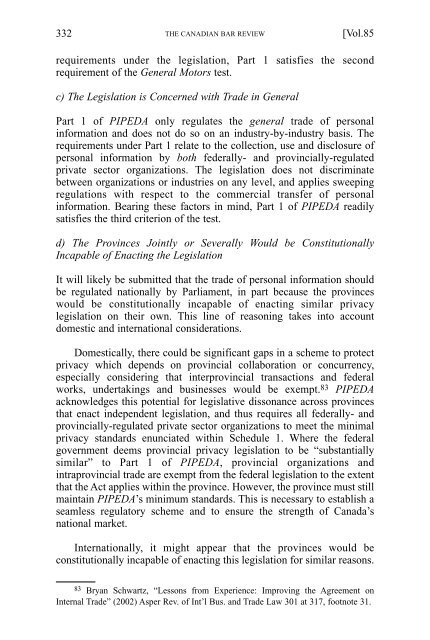PIPEDA: A CONSTITUTIONAL ANALYSIS - Goodmans
PIPEDA: A CONSTITUTIONAL ANALYSIS - Goodmans
PIPEDA: A CONSTITUTIONAL ANALYSIS - Goodmans
Create successful ePaper yourself
Turn your PDF publications into a flip-book with our unique Google optimized e-Paper software.
332 THE CANADIAN BAR REVIEW<br />
[Vol.85<br />
requirements under the legislation, Part 1 satisfies the second<br />
requirement of the General Motors test.<br />
c) The Legislation is Concerned with Trade in General<br />
Part 1 of <strong>PIPEDA</strong> only regulates the general trade of personal<br />
information and does not do so on an industry-by-industry basis. The<br />
requirements under Part 1 relate to the collection, use and disclosure of<br />
personal information by both federally- and provincially-regulated<br />
private sector organizations. The legislation does not discriminate<br />
between organizations or industries on any level, and applies sweeping<br />
regulations with respect to the commercial transfer of personal<br />
information. Bearing these factors in mind, Part 1 of <strong>PIPEDA</strong> readily<br />
satisfies the third criterion of the test.<br />
d) The Provinces Jointly or Severally Would be Constitutionally<br />
Incapable of Enacting the Legislation<br />
It will likely be submitted that the trade of personal information should<br />
be regulated nationally by Parliament, in part because the provinces<br />
would be constitutionally incapable of enacting similar privacy<br />
legislation on their own. This line of reasoning takes into account<br />
domestic and international considerations.<br />
Domestically, there could be significant gaps in a scheme to protect<br />
privacy which depends on provincial collaboration or concurrency,<br />
especially considering that interprovincial transactions and federal<br />
works, undertakings and businesses would be exempt. 83 <strong>PIPEDA</strong><br />
acknowledges this potential for legislative dissonance across provinces<br />
that enact independent legislation, and thus requires all federally- and<br />
provincially-regulated private sector organizations to meet the minimal<br />
privacy standards enunciated within Schedule 1. Where the federal<br />
government deems provincial privacy legislation to be “substantially<br />
similar” to Part 1 of <strong>PIPEDA</strong>, provincial organizations and<br />
intraprovincial trade are exempt from the federal legislation to the extent<br />
that the Act applies within the province. However, the province must still<br />
maintain <strong>PIPEDA</strong>’s minimum standards. This is necessary to establish a<br />
seamless regulatory scheme and to ensure the strength of Canada’s<br />
national market.<br />
Internationally, it might appear that the provinces would be<br />
constitutionally incapable of enacting this legislation for similar reasons.<br />
83 Bryan Schwartz, “Lessons from Experience: Improving the Agreement on<br />
Internal Trade” (2002) Asper Rev. of Int’l Bus. and Trade Law 301 at 317, footnote 31.
















